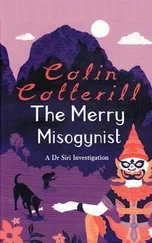Colin Cotterill - The Woman Who Wouldn't die
Здесь есть возможность читать онлайн «Colin Cotterill - The Woman Who Wouldn't die» весь текст электронной книги совершенно бесплатно (целиком полную версию без сокращений). В некоторых случаях можно слушать аудио, скачать через торрент в формате fb2 и присутствует краткое содержание. Жанр: Триллер, на английском языке. Описание произведения, (предисловие) а так же отзывы посетителей доступны на портале библиотеки ЛибКат.
- Название:The Woman Who Wouldn't die
- Автор:
- Жанр:
- Год:неизвестен
- ISBN:нет данных
- Рейтинг книги:3 / 5. Голосов: 1
-
Избранное:Добавить в избранное
- Отзывы:
-
Ваша оценка:
- 60
- 1
- 2
- 3
- 4
- 5
The Woman Who Wouldn't die: краткое содержание, описание и аннотация
Предлагаем к чтению аннотацию, описание, краткое содержание или предисловие (зависит от того, что написал сам автор книги «The Woman Who Wouldn't die»). Если вы не нашли необходимую информацию о книге — напишите в комментариях, мы постараемся отыскать её.
The Woman Who Wouldn't die — читать онлайн бесплатно полную книгу (весь текст) целиком
Ниже представлен текст книги, разбитый по страницам. Система сохранения места последней прочитанной страницы, позволяет с удобством читать онлайн бесплатно книгу «The Woman Who Wouldn't die», без необходимости каждый раз заново искать на чём Вы остановились. Поставьте закладку, и сможете в любой момент перейти на страницу, на которой закончили чтение.
Интервал:
Закладка:
‘You see this uniform?’ she asked. ‘Am I an airline pilot? No. I’m a nurse. And do you know what that means? If they have money to pay me, I earn twenty of your precious greenbacks a month. If you think I’m going to give you a week’s salary for a note, you’re dreaming.’
‘She promised.’
‘No she didn’t. Now, go away.’
‘I walked up from the port just to give you this. My cargo’s still down there. Anyone could walk off with it. I’m doing you a favour.’
‘Then you’d better hurry back.’
Dtui inserted the key in the lock and stepped into her room with nothing more to say. She turned on the light and sighed. She missed the old days when people did favours for purely moral credit. Two minutes later, the letter slid under the door and mumbled curses could be heard heading off into the night. She left the letter lying there, plugged in the kettle, untied the knot that held her daughter and lowered a sleeping Malee on to the mattress. She envied her daughter’s slumber. She told herself for the millionth time how clever she’d been to produce such a beautiful child and how lucky she was that the father was still around. Distracted, perhaps, but devoted.
Once she’d poured the hot water on to her instant noodles she closed her eyes and imagined grilled chicken and turnip and fresh garden cabbage. But her subconscious did nothing for the rehydrated pasta. She owed socialism a debt of gratitude. She thought how much fatter she’d have been if she actually enjoyed her meals. It wasn’t until she was halfway down the bowl of virtual food that she reached for the letter. There were two photographs and a page of handwriting torn from a notebook. Daeng sent her regards. Told her how pleasant Pak Lai was. How much she was looking forward to the boat races. Then she made an unusual request.
The unproductive half of Saturday — unless you happened to be teaching an intensive course to silly nurses — and all of Sunday, were the days the Lao were given to rest their weary joints. To be certain the populace didn’t waste this opportunity, the Party had arranged joyful activities during which a comrade might get together with new friends and laugh and sing uplifting songs. Inevitably, the activities involved the use of garden tools or nails or large tubs of wet cement. The Party would provide a packed lunch of sticky rice and foodstuff fermented to the point of micro-organism meltdown. Nobody was forced to enjoy these adventure weekends. Yes, your neighbourhood chicken counter might take note of your name if you were found lounging in your home. Yes, there might be hold-ups with your rice ration at the co-op. Yes, your name might appear on the list of suspected insurgent sympathizers pinned to the village noticeboard. But, yes, a citizen was perfectly free to choose what he and his family did with his weekend. Madame Daeng had asked Dtui and Inspector Phosy to give up an entire Sunday to conduct a little investigation.
Dtui was only too pleased.
The man calling himself Herve Barnard sat in the closed noodle restaurant on Fahngoum that Madame Keopakam, now Madame Paiboun, aka Daeng, had made her home in Vientiane. The back door hung by its hinges and the bloody tyre iron lay on the table in front of him. He’d already ransacked the upstairs rooms. The bedroom. The messy library with its hundreds of French books. The desk in the small office. There was an album. Black and white photographs of youths at a camp. There was Daeng, the way she’d looked when he’d fallen in love with her. He stared at her. Emotions crashed into him like a multi-vehicle pile-up on an icy motorway. Before her he’d loved nobody. And since? How could he ever trust a woman after that? In five short months she had taken away all those parts of him that gave a person potential. She had been that moment. The fulcrum. The point when everything became unbalanced. As long as she continued to breathe the same air as him, create currents in the same atmosphere, his ever-shortening life would be intolerable. She needed to be gone so that he could die.
He could already smell the smoke. The album. The books. The desk. Soon the entire restaurant. Not spite, merely a tactic of war. Wherever they were they’d hear about this. They’d hurry back. They’d find the body. She would be distraught and vulnerable and distracted and he would kill her. It was the only way to find peace.
The Minister of Agriculture, ex-General Popkorn, and his wife arrived by helicopter at eleven a.m. The last celebrity to make an appearance in the province had been Ai Dum the country music singer and the crowd then had been marginally smaller. But, of course, back then, there hadn’t been cadres going door to door dragging comrades from their hammocks. Back then they hadn’t come ‘to make a good show for the province’. They’d come because they enjoyed a good dance and a sing-song. The crowd of several hundred this Saturday was subdued because they knew the minister would neither sing nor dance, and just as well, perhaps. As he walked through the aisle they’d created for him they seemed unimpressed. Another old man in a grey safari suit.
But what a wife. Madame Ho was every bit as colourful as the old royal regatta pennants. She dressed in Western style in a white and orange frock daringly short to show her lamb-hock calves, and yellow high heels that defied all the principles of foundation engineering. She was a buffalo teetering on half-centimetre points. She was plastered in make-up that from a far distance might have made her look gorgeous. But as she passed the half-heartedly cheering locals with their little Lao flags, they could all see that the cosmetics did not follow the contours of her features. Hers was a deleted and redrawn face whose pencil lines still showed through.
The ministerial arrival was recorded in photographs and they all knew that the caption — Local agronomists show their admiration for their minister — would appear in the next edition of Siang Pasason , which nobody ever read. They hurried ex-General Popkorn to the governor’s house. Governor Siri was in the dark as to the purpose of the visit and the status of all the players he’d been told to accommodate. The official line was that this was an event to pass on the Party’s hopes that the boat races might stimulate camaraderie amongst the proletariat and show the country folk that a little cooperation can achieve a great deal. And that this message would trickle down to cooperative farmers. He had no idea that the minister was in Sanyaburi to evoke a ghost.
After refreshments, the minister went to the river, made a long speech to the assembled boatmen and women, then cut a ribbon suspended between a tree and Miss Sanyaburi, 1978, in traditional dress. And thus the Pak Lai boat race festival was officially opened. The minister waved, shook the governor’s hand and told him he needed a private room to speak with his aides. This room had already been organized and tables had been arranged into a rectangle with all the chairs facing inward to an island of imitation flowers and a handwritten card welcoming Our Dear Friends from Vientiane . The governor was more than a little miffed to have been excluded from this gathering.
Attending the closed meeting were the minister and his wife, Madame Peung and her brother, Tang, Dr Siri the coroner and his wife, Daeng, and a retarded fellow whom the minister assumed to be some part of the ceremony. The minister sat at a ridiculous teak throne dragged in at great expense to make an impression. To his left sat Siri. The general remembered the old doctor from numerous battlefront campaigns. Like many of his ministerial colleagues he had great respect for the doctor’s skills behind the front line, patching up wounded comrades and saving lives. But, also like his colleagues, he found the old man’s reluctance to take orders a reflection of his anarchistic leanings. He was to be avoided socially. There had been a circular to that effect. The party line was that Dr Siri Paiboun had been ideologically tainted by too many years in France and the early onset of senility. It didn’t however stop them from using his various skills whenever their own were lacking. And, on this day, in this room, Siri was the minister’s only ally.
Читать дальшеИнтервал:
Закладка:
Похожие книги на «The Woman Who Wouldn't die»
Представляем Вашему вниманию похожие книги на «The Woman Who Wouldn't die» списком для выбора. Мы отобрали схожую по названию и смыслу литературу в надежде предоставить читателям больше вариантов отыскать новые, интересные, ещё непрочитанные произведения.
Обсуждение, отзывы о книге «The Woman Who Wouldn't die» и просто собственные мнения читателей. Оставьте ваши комментарии, напишите, что Вы думаете о произведении, его смысле или главных героях. Укажите что конкретно понравилось, а что нет, и почему Вы так считаете.












